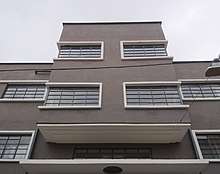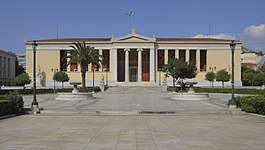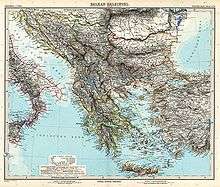University of Thessaly
|
Πανεπιστήμιο Θεσσαλίας | |
 | |
| Type | Public |
|---|---|
| Established | 1984 |
| Chancellor | Georgios Petrakos |
| Vice-Chancellor |
Zissis Mamouris Vassilis Bourdakis Athanassios Sfougaris Ioanna Laliotou |
| Undergraduates | 14,000 |
| Postgraduates | 2,150 |
| 1,400 | |
| Location |
Volos Larissa Karditsa Trikala Lamia, Greece |
| Affiliations | EASN |
| Website | http://www.uth.gr |
The University of Thessaly (UTH; Greek: Πανεπιστήμιο Θεσσαλίας) is a university in Thessaly, Greece, founded in 1984.[1] The administrative and academic centre of the university is based in Volos, but campuses operate also in Larissa, Trikala, Karditsa and Lamia.[2]
As of 2014, there is a student population of approximately 14,000 undergraduate students enrolled at the university, more than 3,500 postgraduate students and 710 faculty members.
Emblem
The emblem of the University of Thessaly is Chiron, who used to live in Pelion Mountain and was famous for his special knowledge about medicine, music, archery, hunting, gymnastics and the art of prophecy.


History
The university has eighteen Departments in six Faculties, the majority of them founded by the end of 2001.[1] In 2013, the Department of Computer Science and Biomedical Informatics of University of Central Greece was added to the University of Thessaly with the campus remaining in Lamia.[3]
Faculties and departments
The university comprises six faculties: Humanities and Social Sciences, Engineering, Agricultural Sciences, Health Sciences, Physical Education and Sport Sciences and Sciences, which contain 18 departments offering undergraduate and post-graduate degree programs.[4]
Each department has its own associated student organization. The language of instruction is Greek, although there are programs in foreign languages and courses for international students, which are carried out in English, French, German and Italian.
| Faculties | Departments |
|---|---|
| School of Engineering (Polytechneio) [5] (Volos) |
|
| School of Health Sciences (Larissa-Karditsa) |
|
| School of Agriculture Sciences (Volos) |
|
| School of Education (Volos) |
|
| Faculty of Physical Education and Sport Sciences [6] (Trikala) |
|
| School of Science [7] (Lamia) |
|
The Faculty of Health Sciences is greatly associated with the General University Hospital of Larissa.

Staff
The university staff is divided into five main categories:
- Teaching and research staff: The staff in this category undertakes the majority of the teaching and research work done in the university. It comprises professors, associate professors, assistant professors and lecturers.
- Scientific teaching staff: This category consists of former teaching and research assistants. Their main role is to cooperate with the Teaching and Research staff and assist them in their teaching responsibilities.
- Special laboratory teaching staff: The members of this category are administering the university laboratories and they undertake special applied and laboratory teaching work.
- Special technical laboratory staff: They are responsible of keeping the laboratory equipment in good condition and upgrade it whenever necessary in order to stay up to date. They also provide specific technical laboratory services and help with the laboratory teaching.
- Administrative staff: This category comprises all employees working in administrative positions.
The educational work is also exercised by guest professors and scientists who are invited to teach specific courses.
Academic evaluation
In 2015 the external evaluation committee gave University of Thessaly a Positive evaluation.[8]
An external evaluation of all academic departments in Greek universities was conducted by the Hellenic Quality Assurance and Accreditation Agency (HQAA) in the previous years.[9]
- Department of Physical Education and Sport Science (2010) [10]
- Department of Agriculture, Crop Production and Rural Environment (2010) [11]
- Department of Ichthyology and Aquatic Environment (2011) [12]
- Department of History, Archaeology and Social Anthropology (2010) [13]
- Department of Primary Education (2013) [14]
- Department of Early Childhood Education (2013) [15]
- Department of Special Education (2013) [16]
- Department of Mechanical Engineering (2010) [17]
- Department of Biomedical Informatics (2010) [18]
- Department of Civil Engineering (2011) [19]
- Department of Architecture (2012) [20]
- Department of Urban Planning & Regional Development (2014) [21]
- Department of Biochemistry and Biotechnology (2011) [22]
- Department of Medicine (2011) [23]
- Department of Veterinary Science (2012) [24]
- Department of Economics (2014) [25]
University Units
Library & Information Center
Library and Information Center of University of Thessaly was founded in 1995. Its central building is hosted in the renewed building of the old Athens Bank, which was built in 1903, and is located in the center of Volos. Moreover, there are branches of the Library that operate in every faculty in all cities of University of Thessaly. The Kitsos Makris Folklore Center is also part of the University of Thessaly Library & Information Center.
Residence hall
University of Thessaly owns a small Student Residence Hall in Volos with a capacity of 40 rooms. There is also an accommodation grant of 100 € per month for the undergraduate foreign students of countries outside EU. For the Greek students and also the students of countries members of EU there is an accommodation grant of 1000 € per year depending on academic and financial criteria. There are plans for the development of a new large scale residence hall in the near future.
Psychological Counseling and Support for Students
The Laboratory of Psychology and Educational Applications of the Department of Special Education offers psychological support and help to all students who need it, in order to deal with their personal difficulties and concerns, and it also helps in developing skills on how to manage potential problems, such as problems in student life, difficulties in personal relations and other psychological disorders.
The students make an appointment with the psychologist of the Laboratory, either individually or in groups; they also may participate in seminars that are organised in regular time intervals. All services are provided free of charge and the meetings have confidential character.
Culture and Sports
University of Thessaly offers the possibility of many sports and cultural activities. There are many student groups consisting the team of Physical Education, Musical Ensembles, Theater Group, Photography Group etc. In the beginning of every semester the students have the opportunity to enter in every action that are interested in. Moreover, there is plenty of student groups that undertake cultural actions such as Cinema Group and University of Thessaly Student Radio.
See also
References
- 1 2 "University of Thessaly - History". University of Thessaly.
- ↑ "University of Thessaly - Campuses". University of Thessaly.
- ↑ ""ATHENA" Reform Plan for Higher Education" (in Greek). www.minedu.gov.gr.
- ↑ "University of Thessaly - Schools and Departments". University of Thessaly.
- ↑ "University of Thessaly, School of Engineering". University of Thessaly.
- ↑ "University of Thessaly, School of Physical Education and Sport Sciences". University of Thessaly.
- ↑ "University of Thessaly, School of Science". University of Thessaly.
- ↑ "University of Thessaly - External Evaluation Report" (PDF). www.adip.gr. 2015. "UTH provides a positive and collegial work environment. The EEC believes that with hard work and dedication, the University of Thessaly will be able to reach its full potential in the near future."
- ↑ "HQA". Retrieved 24 July 2015.
- ↑ HQAA Final Report - Department of Physical Education and Sport Science, University of Thessaly, 2010
- ↑ HQAA Final Report - Department of Agriculture, Crop Production and Rural Environment, University of Thessaly, 2010
- ↑ HQAA Final Report - Department of Ichthyology and Aquatic Environment, University of Thessaly, 2011
- ↑ HQAA Final Report - Department of History, Archaeology and Social Anthropology, University of Thessaly, 2010
- ↑ HQAA Final Report - Department of Primary Education, University of Thessaly, 2013
- ↑ HQAA Final Report - Department of Early Childhood Education, University of Thessaly, 2013
- ↑ HQAA Final Report - Department of Special Education, University of Thessaly, 2013
- ↑ HQAA Final Report - Department of Mechanical Engineering, University of Thessaly, 2010
- ↑ HQAA Final Report - Department of Computer Science and Biomedical Informatics, University of Thessaly, 2010
- ↑ HQAA Final Report - Department of Civil Engineering, University of Thessaly, 2011
- ↑ HQAA Final Report - Department of Architecture, University of Thessaly, 2012
- ↑ HQAA Final Report - Department of Planning & Regional Development, University of Thessaly, 2014
- ↑ HQAA Final Report - Department of Biochemistry and Biotechnology, University of Thessaly, 2011
- ↑ HQAA Final Report - School of Medicine, University of Thessaly, 2011
- ↑ HQAA Final Report - Department of Veterinary Science, University of Thessaly, 2012
- ↑ HQAA Final Report - Department of Economics, University of Thessaly, 2014
External links
- University of Thessaly official website (in Greek) (in English)
- University of Thessaly Faculties and Departments (in Greek) (in English)
- University of Thessaly Research Laboratories (in Greek) (in English)
- University of Thessaly Research Committee
- University of Thessaly DASTA Office (Career Office & Innovation Unit) (in Greek)
- Hellenic Quality Assurance and Accreditation Agency (HQAA) (in Greek) (in English)
- Department of Physical Education and Sport Science, HQAA Final Report, 2010 (in English)
- Department of Agriculture, Crop Production and Rural Environment, HQAA Final Report, 2010 (in English)
- Department of History, Archaeology and Social Anthropology, HQAA Final Report, 2010 (in English)
- Department of Mechanical Engineering, HQAA Final Report, 2010 (in English)
- Department of Ichthyology and Aquatic Environment, HQAA Final Report, 2011 (in English)
- Department of Civil Engineering, HQAA Final Report, 2011 (in English)
- Department of Biochemistry and Biotechnology, HQAA Final Report, 2011 (in English)
- Department of Veterinary Science, HQAA Final Report, 2011 (in English)
- School of Medicine, HQAA Final Report, 2011 (in English)
- Department of Computer Science and Biomedical Informatics, HQAA Final Report, 2011 (in English)
- Department of Architecture, HQAA Final Report, 2012 (in English)
- Department of Primary Education, HQAA Final Report, 2013 (in English)
- Department of Early Childhood Education, HQAA Final Report, 2013 (in English)
- Department of Special Education, HQAA Final Report, 2013 (in English)
- Department of Planning & Regional Development, HQAA Final Report, 2014 (in English)
- Department of Economics, HQAA Final Report, 2014 (in English)
- Department of Computer Science and Biomedical Informatics
- Greek Research & Technology Network (GRNET) (in Greek) (in English)
- okeanos (GRNET's cloud service) (in Greek) (in English)

